Share
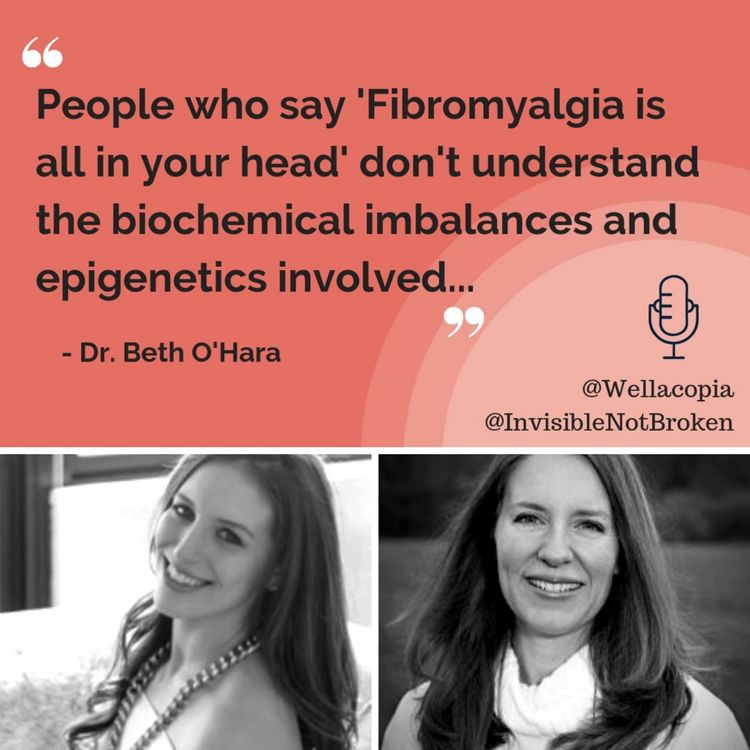
Invisible Not Broken - Chronic Illness Podcast Network
360° Treatment for Fibromyalgia, Mast Cell, ME/CFS and more - with Dr. O'Hara and Eva of Wellacopia
Visit Wellacopia to find your ideal practitioner for you chronic illness
Visit BethOHara.com to check our her services and more information
___________
Dr. Beth O'Hara's questions
· What is/was your profession?
Functional Naturopath – incorporating genetic analysis, naturopathy, and emotional wellness. I am also a Functional Genomics Analyst. Created Mast Cell 360, a Functional Naturopathy practice for people struggling with Mast Cell Activation Syndrome and related disorders.
· What is your illness(es)?
Mast Cell Activation Syndrome and Histamine Intolerance, Chronic Fatigue, Hypermobility disorder, Mold Illness, Fibromyalgia, Oxalate Issues
· Where do you work/what’s your business?
I own and run Mast Cell 360, a Functional Naturopathy practice I created to provide personalized, holistic healing plans for each person based on genetic analysis, symptom and health history analysis, lab interpretation, and emotional wellness support.
· What types of patients/conditions do you work with?
I like to use the word client instead of patient to emphasize that I work in collaboration with my clients instead of a more hierarchical doctor/patient relationship.
Most healthcare protocols work well for 80% of people with xyz symptoms, but there are always 20% who fall through the cracks. This is my area - the 20% of people with chronic illness for whom standard protocols aren’t working for. I work with chronic fatigue, fibromyalgia, hypermobility issues, autism spectrum disorders, chemical sensitivity and mold illness. These are all related to my primary specialties – Mast Cell Activation Syndrome and Histamine Intolerance.
_______________________
1. What makes your approach to care unique?
Mast Cell 360 is a place to be fully seen and heard, emotionally supported, and with cutting edge health care practices and techniques to allow people to heal. The Mast Cell 360 process incorporates all facets of healings – biochemical, environmental, emotional, and mental.
My background is very integrative. I was a Yoga Therapist for many years, studying physiology and the connections between the mind and body. I taught meditation. I studied a personal development and emotional growth system called the Enneagram in depth and taught it internationally. I have Bachelor’s in Physiological Psychology and Masters in Marriage and Family Therapy, and I have a strong background in genetic analysis and biochemistry, which is where I look for why people fall through the cracks with standard protocols. I’m always wondering - What genetic variants are impacting health for this person? Are there any suboptimal nutrient levels? What biochemical pathways are blocked? What are the missing puzzle pieces? Is there a big stress component or a previous trauma factor?
From there, I also wonder about each person – how did this person’s life shape their health? Were there early events that affected the immune system? Are there stressful current events affecting this person’s health? And how is chronic illness affecting this person’s emotional state and social life? How do all these pieces weave together?
For me, we can’t isolate physiological/biochemical health from emotional and mental states. They are interwoven. This is what the 360 in Mast Cell 360 means to me – seeing the whole person and working with the person as a whole.
2. How did your illness shape your career?
I was determined at 6 years old I was going to go the medical school, and I worked really hard for it. I really wanted to be a neurologist or neurosurgeon. I would stay in anatomy labs during lunch to keep dissecting, and all I wanted for my 16th birthday was Gray’s Anatomy. I was on the pre-med track in college, and I got a full scholarship to medical school. I was taking a full class load, doing independent study research, working 3 jobs to pay bills, and I drank too much to cope with stress. One day my health just gave out. I was so exhausted, I couldn’t go. I’d had fatigue issues most of my life and other issues I now can recognize as immune dysregulation, but I could always push through. But this time I couldn’t push through any more. I was completely flattened with exhaustion and nearly paralyzed with biochemical anxiety. I had to turn down the scholarship, which was devastating for me. I had no idea what else to do with my life. I thought I was born to be a physician, and it was all stripped away.
I still had faith at that point that Western Medicine had all the answers, and I started going from doctor to doctor. I had very well-meaning practitioners offer meds that made me way worse. And I had practitioners who told me I was crazy and making up my symptoms. I think because I was so sick, but that my labs were normal, they just didn’t know what to do with me. Then I tried alternative and holistic practitioners – everything from homeopathy to muscle testing. I did psychotherapy because I started to think I really was crazy.
At one point I totaled up I had seen over 50 practitioners and spent over $100,000, and I just kept getting worse. I developed severe insomnia and couldn’t sleep for over 4 years. I was in excruciating joint pain and had to use a cane to hobble to the bathroom. I was down to 30 foods, counting salt, pepper, and herbs. I had paradoxical reactions to most supplements I tried and frightening med reactions. I started realizing I was going to have to figure things out for myself, and with the pre-med background I was able to absorb everything I could get my hands on regarding chronic health conditions. It took a while for me to piece it together, though. To cope with how miserable my life had become, I turned to meditation and spiritual and emotional growth to help me get through.
In the meantime, the darkest day for me was when a very experienced Functional Medicine physician told me he didn’t have any other options for me – that we had tried everything he knew how to do. I sobbed the entire drive home. I was in a small, private Facebook group of women and I reached out and told them I didn’t know what else to do. I had no quality of life and I didn’t want to live anymore. A woman in the group reached back out and recommended I run my 23andme data on genetics. I had no idea how to get started, but she stepped me through the beginnings of genetic interpretation. We only knew about around 32 gene variants back then and were working off of Dr. Amy Yasko’s work. But even in those 32 gene variants, I found a lot of answers for myself. This was the beginning of my health turning around.
Today we are up to interpreting 14,000 genetic variants and looking at how they can affect health. We also have complex biochemistry analysis that wasn’t available back then. My health improvement was so dramatic, people started asking me if I could help them, so I started health coaching. Then I wanted to this work on a much greater depth, so I became a Functional Naturopath.
When I created Mast Cell 360, my practice, I wanted it to be the dream experience I so desperately needed when I was really ill. It really is the culmination of all these life experiences. I’m very glad now I didn’t go on to medical school because I find the work I’m doing now much more valuable and meaningful. And if I can take the nightmares I went through, and use it to help others, that makes it worthwhile.
3. What do/did you do when you don’t know what to do about a patient?
. I get a lot of mystery clients that have stumped other practitioners. First, I step back and look at the big picture to see what might have been missed. I’m big on research, so I start digging. With my process, I’ve been able to increase the standard success rate from 80% to 95%. I’m really fortunate to be a research advisor for a great think tank run by Dr. Bob Miller called the Nutrigenetic Research Institute. It is a great group of practitioners like Mackay Rippey of Lyme Ninja radio, Emily Givler, and Dr. Lari Young. They are always very helpful. I also have a network of other top-notch practitioners I consult with to get their input. I’ve also done joint consults with other practitioners where 2 practitioners are on a call with a client so we can put our heads together. This kind of collaboration is critical for all of us working with complex people – there is so much to learn and know. When we can team together like this for people, we can be more effective for our clients.
4. Are/were you open about your illnesses with your patients?
Yes, I’ve learned people prefer I share my own illness and struggles within the context of how it could help the person in front of me. I used to not share because I didn’t want to burden people, but I was teaching a yoga therapy class one time and was at one of my lowest points. My pain was through the roof and I was struggling with anxiety. I couldn’t drive myself to the class –someone had to drive me, but I was dedicated to showing up for the people there. I told them at the beginning of the class I didn’t know if I could make it through the class but I would do my best. One of the long-time students told me at the end that was the best class I’d taught because she could relate to my struggles and it helped her see that if I could get through the day with my issues, she could get through her day.
Now, I share about my health struggles for two reasons, One, when I tell people how sick I was and they see where I am now, it gives them hope that they can get better too. Two, I share with people what I’m still dealing with because it helps them see that we are all human and sets realistic expectations. Even though I’m worlds better, I’m not symptom free or maintenance free. I still have to work on my health, and I still get flares if I stray off my diet, get sick, or have severe stress.
5. What does “trust” mean to you in the patient-practitioner relationship?
Trust means people can count on me to be honest, in integrity, genuine, and compassionate. The first appointment I have with people, I work on trust building right away. I know myself how vulnerable it is to share your health history and to have to rely on someone to help you with your health. There are a lot of people who prey on those who are sick. I never want my clients to feel this way. I want them to know I have their back 100% of the way. I also want them to know that if I don’t know something, I will tell them and I’ll do my best to find out what we need to know. I find sharing my story in a way that is applicable to that client’s situation makes a big difference.
I also have to be able to trust my clients to be honest with me about what they are and aren’t doing – are they following through? I always appreciate it when people tell me they just really fell off the wagon with their diet or stopped taking their supplements. Then we can figure out how to course correct, but if I don’t know what is going on, I can’t help them fix it. This is why trust building is so important – so people feel comfortable being vulnerable.
6. What are you most passionate about in regard to your work/helping people?
I’m passionate about helping people who keep falling through the cracks in healthcare. I know what it is like to have no one to turn to for help or answers. Traditional medicine usually fails for chronic conditions. Even alternative and holistic health providers struggle with mystery clients. I get excited about researching for clients what makes them unique. What is it that has been holding this client back? Then watching the transformation for someone when we find the right pieces for them – that is what makes my day.
7. How do/did you handle flares while at work?
I have structured my work to be able to take care of my health. I have the least energy in the morning so I don’t start until noon or 1p. This also gives me time to exercise, eat well, take my supplements, and meditate before I start. If I’m flared, I have extra time to take care of myself or to sleep more if needed. If I’m flared when I’m with clients, I have always found that when I start to concentrate on the person in front of me I forget that I don’t feel well. Fortunately, I’m don’t have flares now that prevent me from working.
8. How do/did you handle being a practitioner, patient and your personal life?
It takes a bit of work. Sometimes I forget as a practitioner that it is ok to reach out for help about my own health. I was consulting with another practitioner and told I feel like I should be able to wade through my own health issues. She made a good point when she said if you were a surgeon you wouldn’t try to do surgery on yourself. It can be hard for even practitioners to figure out their own health challenges because we need a second set of eyes on everything. As far as my personal life, it takes some balancing to make sure I’m spending enough time with friends and having fun. I can get really intense into researching a new area, and I have to step away sometimes to reset.
9. Do you tell your patients what you tell yourself/do you practice what you preach?
Absolutely. I really have to because I don’t have a lot of leeway with my own health to stray too far. At the same time, I’m human and I share that too. I was talking with a client who had started binging on chips and other less healthy foods and was feeling embarrassed about it. I shared that I’d eaten a gluten free cookie (I usually completely avoid sugar) and then a bunch of cassava chips in the same day which was too much higher histamine foods. I paid for it, but because my symptoms are very clear and quick, if I fall off the wagon I’m really motivated to clean up my diet again right away.
10. How do you research conditions? On your own? Drug companies? Medical journals? Colleagues? How do you convey this knowledge to patients?
There is so much new information coming out every day, it is impossible to stay on top of everything but essential to try. I feel like I’m always drinking through a firehouse. I do a lot of reading – journal articles, textbooks, online articles. I’m in practitioner groups on Facebook where we discuss cases. I’m always following practitioner webinars, taking a course on something, and going to conferences. I’m a research advisor in a great think tank – Nutrigenetic Research Institute, led by Bob Miller. Our group shares research and we dialogue about it – this is great because we can divide and conquer topics this way.
I try to distill this information down into ways that are accessible to clients. I really like to use graphs and charts of biochemical pathways – I think the visuals help people see what might be happening in their bodies.
11. How have you found care? Did you find good practitioners? What was your experience like?
I personally really struggled for years. Mast Cell Activation Syndrome only got a diagnosis code in 2016, and I’ve had this my whole life. Mast Cell Activation Syndrome has gotten much more attention in the past year, fortunately. I had some terrible experiences where people told me all my symptoms where in my head and I was just stressed because my labs were normal. I had some very well-meaning and empathetic practitioners who tried to help, but those standard protocols made me worse. Before I became a Naturopath, I didn’t get much significant help. Once I became a practitioner, I met a number of other practitioners and I’ve since worked with people who were able to help me, particularly my genetic mentor Bob Miller who has done an incredible amount of work helping me understand genetic pathways. Emily Givler is a wonderful practitioner who has helped me solve some of my gut and oxalate issues.
As far as they spectrum of experiences I had, healthcare providers are human beings just like everyone else. We have good days and bad days. Some of the doctors who told me it was all in my head were likely overwhelmed with my huge list of symptoms and confused by my normal labs. They definitely never learned about the type of issues I had in medical school because medical school didn’t teach about Mast Cell Activation Syndrome back then and even Fibromyalgia and Chronic Fatigue weren’t really understood.
Just like in any profession, in healthcare there are people who are just there to earn a paycheck, people who care but who are mediocre, people who are reasonably good, and people for whom healthcare is their mission and purpose in life. Those people are the ones who are driven to learn everything they can above and beyond their training, stay up at night solving a problem, and will do everything possible to help their clients. It is also a matter of finding a match with the right provider – someone who is an expert in your particular health issues. This is really key.
12. Tell us about a special experience with a patient that you found to be inspiring.
I had a client who had fairly significant Mast Cell Activation Syndrome, Chronic Fatigue, Histamine Intolerance, possible chronic Lyme, Subclinical Porphyria and Hashimoto’s. She was a single mom, worked full time at a high pressure job, and was so exhausted she would have to nap in car after she dropped her daughter off for school and before she drove to work. Then she would be falling asleep in the afternoon. She had seen a few Functional Medicine doctors, and would get a little better but was still really struggling. She felt like she was barely functioning and doing everything she could to hand onto her job. She really wanted to exercise, but she was so exhausted she just couldn’t do it.
First, I was really inspired by how she soldiered through each day with how terrible she felt. She worked really hard on her diet, even though sometimes she had little time to create anything for dinner. I know how hard it is to live a normal life and need to pay special attention to your health, but she did an amazing job of balancing things. We worked through her genetics and worked with her protocol bit by bit as she could manage in her life. Then I didn’t hear from her for a while, and I was really wondering how she was doing. She emailed me that she and her daughter to a trip to New York and she had walked 10 miles in a week. I was astounded! We had landed on just the right combo for her, but she did the hard work of sticking to it day after day, week after week, and her energy came back as her body recovered. It is one thing to be on my side and find answers for people, but then they have to do the work every day.
13. If you had one message to send out to every chronic illness patient out there, what would it be?
Don’t give up. Keep looking for the answers – they are out there and if you don’t give up you will find them. When I was at my most sick, I could barely leave my house and had to use a cane to be able to walk. I had seen so many practitioners and spent so much money. I really wanted to die, but I just knew to the core of my being that if I could find the root causes affecting my health, I could heal. I knew the puzzle pieces would come together eventually. I don’t know why or where it came from, but I had and still have this unshakable conviction that I could heal. I carry that for each of my clients too – for chronic illnesses we can heal. We have to find the right practitioner to help us and then we have to do the hard work each day to get better.
14. Where can the audience find you in terms of social media, website, etc.? What would you like to promote if anything?
My website is MastCell360.com There are some great articles on there about how to know if you have Mast Cell Activation Syndrome and on the blog there are a lot of articles on how to deal with these issues from day to day. I even have a number of healthy low histamine recipes on there, and I send out a weekly newsletter with new tips, recipes, and information.
If anyone thinks they may have Mast Cell Activation Syndrome or Histamine Intolerance, they can go to mastcell360.com/freereport and download a free report on root causes to Mast Cell Activation Syndrome and Histamine Intolerance.
Even if listeners don’t think they have mast cell or histamine issues, those root causes are the same for many different chronic conditions so the report may help them.
I work with Mast Cell Activation Syndrome, Histamine Intolerance, Fibromyalgia, Chronic Fatigue, Mold Toxicity, and other complex chronic issues. If anyone wants to know if I can help, they can use the contact form on the website to send a brief health history and what they’ve already tried. I’ll write back and let them honestly know if I can help.
You can also find me on Facebook at Mast Cell 360.
More episodes
View all episodes
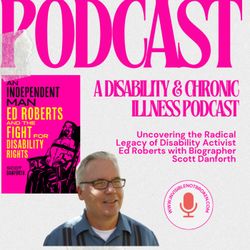
Uncovering the Radical Legacy of Disability Activist Ed Roberts with Biographer Scot Danforth
50:59|Uncovering the Radical Legacy of Disability Activist Ed Roberts with Biographer Scott DanforthKeywordsEd Roberts, disability rights, activism, biography, independence, community, technology, publishing, women in activism, accessibilityTakeawaysEd Roberts was a pivotal figure in the disability rights movement.His activism began at UC Berkeley with the Rolling Quads.The fight for disability rights is ongoing and requires constant vigilance.Family dynamics play a crucial role in fostering independence for disabled individuals.Community building is essential for effective activism.Technology can greatly enhance accessibility for disabled individuals.The Center for Independent Living was a groundbreaking initiative for disability rights.Women played a significant but often overlooked role in the disability rights movement.Writing a biography involves difficult choices about what to include or exclude.The publishing process can be challenging, especially for underrepresented stories.SummaryThis conversation explores the life and legacy of Ed Roberts, a pivotal figure in the disability rights movement. Scott Danforth, the author of a biography on Roberts, discusses the challenges and triumphs of advocating for disability rights, the importance of community and independence, and the role of technology in enhancing accessibility. The conversation also touches on the often-overlooked contributions of women in the movement and the complexities of writing a biography. Danforth shares insights from his research and the publishing process, emphasizing the need for continued advocacy and the importance of storytelling in the fight for disability rights.TitlesUnveiling Ed Roberts: A Disability Rights PioneerThe Legacy of Ed Roberts and Disability ActivismSound bites"This is not a very well-known man.""He had polio as a teenager.""He loved the technology."Chapters00:00 Introduction to Ed Roberts and His Legacy02:13 The Fight for Disability Rights09:07 Independence and Family Dynamics14:53 Building Community and Activism21:28 Technological Advancements and Accessibility26:57 Revitalizing the Center for Independent Living27:24 The Legacy of Ed Roberts and Disability Activism28:23 Unveiling the Myths of Disability Leadership30:49 The Unsung Heroes of the Disability Rights Movement31:54 Chronic Illness and the Overlooked Voices33:30 The Joys and Challenges of Writing a Biography35:21 The Process of Research and Writing36:17 Editing and Storytelling in Biography38:44 Navigating the Publishing Landscape41:25 The Journey into Disability Studies43:58 Dreams vs. Reality in Disability Advocacy46:46 The Importance of Community and Creativity48:23 Joy as Resistance in Activism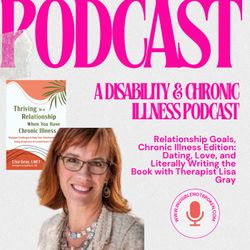
Relationship Goals, Chronic Illness Edition: Dating, Love, and Literally Writing the Book with Therapist Lisa Gray
43:45|Keywordschronic illness, relationships, conflict resolution, empathy, writing process, power imbalance, emotional management, self-help, therapy, communicationSummaryIn this conversation, Lisa Gray, a marriage and family therapist, discusses the complexities of relationships when chronic illness is involved. She shares insights on conflict resolution, the importance of empathy, and how to navigate power imbalances in relationships. Lisa also delves into her writing process, the significance of finding meaning in chronic illness, and practical tools for writing and publishing. The discussion emphasizes the need for understanding, communication, and the ability to adapt in relationships affected by chronic illness.TakeawaysConflict increases intimacy if done right.Healthy conflict means knowing your partner better.Stop fighting when you're already mad.Impulse control is key in managing conflict.Power imbalances can affect relationships with chronic illness.Empathy must go both ways in relationships.Finding meaning is crucial in the grieving process.Values can guide actions despite chronic illness.Writing can be a therapeutic process.Use tools that work for your energy levels.TitlesNavigating Relationships with Chronic IllnessThe Art of Healthy ConflictSound bites"Empathy needs to go both ways.""Intimacy is very broad.""Weighted blankets are so comforting."Chapters00:00 Introduction to Chronic Illness and Relationships02:55 Navigating Conflict in Relationships06:02 Impulse Control and Managing Emotions09:07 Power Imbalances in Relationships11:54 Empathy in Chronic Illness Relationships14:57 Core Skills for Managing Chronic Illness17:42 Finding Meaning and Values in Relationships20:55 Personal Discoveries Through Writing23:55 Building Empathy Through Curiosity24:15 Exploring Virtual Reality and Empathy25:39 Relationships and Support in Chronic Illness28:05 Intimacy and Chronic Illness30:30 The Writing Process and Tools for Writers38:58 Publishing Insights and ResourcesTranscript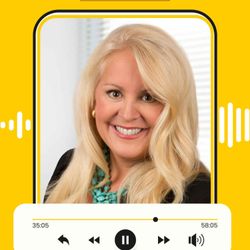
Navigating the Patient Journey with Author Brenda Snow
41:00|SummaryIn this conversation, Brenda Snow shares her personal journey as a patient diagnosed with multiple sclerosis and discusses her book, 'Diagnosed: The Essential Guide to Navigating the Patient Journey.' She emphasizes the universal experience of navigating chronic illness, the importance of grief and acceptance, and the need for strong doctor-patient relationships. Brenda also highlights the significance of maintaining one's identity while caregiving and the power of storytelling in healing. The discussion concludes with advice for aspiring writers and the importance of sharing personal narratives.Chapters00:00 Introduction to Brenda Snow and Her Journey02:49 The Universal Patient Experience06:48 Navigating Grief and Acceptance12:41 The Doctor-Patient Relationship20:42 Identity and Caregiving26:12 Finding Growth in Adversity31:56 The Power of Storytelling35:40 Advice for Aspiring Writers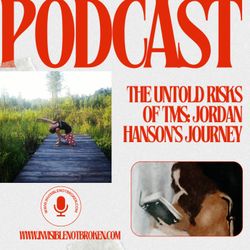
The Untold Risks of TMS: Jordan Hanson's Journey
01:00:05|KeywordsTMS, transcranial magnetic stimulation, brain injury, mental health, medical gaslighting, patient advocacy, chronic illness, technology in healthcare, self-care, mindfulnessSummaryIn this conversation, Jordan Hanson shares her personal journey with transcranial magnetic stimulation (TMS), a procedure intended to treat mental health issues. She discusses the initial excitement about the treatment, the subsequent negative effects she experienced, and the challenges of navigating the medical system. The conversation highlights the importance of patient advocacy, community support, and the role of technology in managing health. Jordan emphasizes the need for awareness and understanding of the risks associated with TMS and the importance of self-care and mindfulness in coping with chronic illness.TakeawaysTMS is a procedure that uses magnetic fields to stimulate brain activity.Jordan experienced significant negative effects from TMS, including brain injury symptoms.Medical gaslighting is a common issue faced by patients seeking help.Community support is crucial for those dealing with chronic illness.Technology, including AI, can assist in managing health and communication.Self-care and mindfulness are essential for coping with chronic illness.Advocacy is important to raise awareness about the risks of TMS.Family planning can be complicated by health issues and uncertainties.Understanding the impact of chronic illness on daily life is vital.The journey of healing is ongoing and requires patience and support.TitlesThe Hidden Risks of TMS: A Personal JourneyNavigating the Medical Maze: Jordan's TMS ExperienceSound bites"I was called headache girl for a year.""I want to share my story to help others.""I have to protect myself and my energy."Chapters00:00 Introduction to TMS and Jordan's Journey01:13 Understanding the Impact of TMS on Life01:28 Introduction and Background on TMS04:20 Understanding Trans-Cranial Magnetic Stimulation (TMS)07:23 The Experience of TMS Treatment10:20 The Impact of TMS on Daily Life13:09 Medical Gaslighting and Patient Advocacy16:13 The Journey to Recovery and Diagnosis19:14 Community Support and Sharing Stories22:18 The Decision to Create a Documentary25:13 Advocacy and Future Goals36:11 The Need for Scientific Understanding in TMS40:42 Coping with Chronic Illness and Disability44:52 Navigating Family Planning Amidst Uncertainty52:54 Leveraging Technology for Brain Injury Support59:42 Personal Growth Through Adversity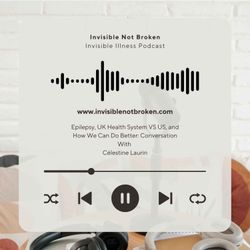
Epilepsy, UK Health System VS US, and How We Can Do Better: Conversation With Célestine Laurin
01:20:40|Epilepsy, UK Health System VS US, and How We Can Do Better: Conversation With Célestine LaurinSummaryIn this conversation, the speakers delve into the complexities of living with epilepsy and chronic illness, particularly focusing on the experiences of children and young adults. They discuss the challenges of diagnosis, the importance of support from family and friends, and the role of therapy in managing mental health. The conversation also touches on the stigma surrounding chronic illness, the impact of bullying, and practical advice for managing seizures and advocating for oneself in educational and social settings. Additionally, they explore how epilepsy is represented in the media and the need for better understanding and communication around the condition. This conversation delves into the complexities of living with epilepsy, particularly focusing on the challenges faced by women regarding medication and pregnancy. The speakers share personal experiences with the impact of epilepsy on their lives, careers, and the healthcare system. They discuss the stigma surrounding chronic illness, the importance of open communication with clients in business, and the differences in healthcare systems across countries. The conversation highlights the need for greater awareness and understanding of disability and chronic illness. In this conversation, the speakers discuss the challenges faced by individuals with disabilities, the impact of overprotection on children, and the need for inclusive spaces and universal design. They explore the healthcare systems in different countries, highlighting the disparities in access and affordability. The conversation emphasizes the importance of disability advocacy in health policy and the need for a more inclusive approach to legislation that considers the needs of all individuals, particularly those with chronic illnesses.Keywordsepilepsy, chronic illness, mental health, therapy, support, bullying, childhood illness, accommodations, media representation, epilepsy, medication, women’s health, chronic illness, disability, healthcare, personal stories, photography, career choices, mental health, disability, healthcare, universal design, overprotection, advocacy, inclusivity, chronic illness, education, mental health, accessibility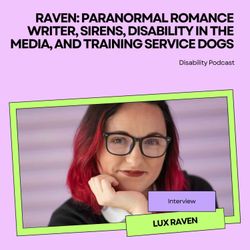
Raven: Paranormal Romance Writer, Sirens, Disability in the Media, and Training Service Dogs
52:33|Chapters00:00 Introduction to Romance Writing and Disability05:49 Life Changes During the Pandemic11:53 Writing Romance with Chronic Illness17:55 Representation of Disability in Romance24:35 The Viral Success of a Romance Novel31:07 Writing as a Form of Self-Discovery36:06 Navigating Writing with Disabilities49:59 The Journey of Training a Service DogSummaryIn this conversation, the speakers delve into the intersection of romance writing and disability representation, particularly focusing on the experiences of chronically ill individuals. They discuss the impact of the pandemic on their lives, the process of writing romance novels that feature disabled characters, and the importance of authentic representation in literature. The conversation also touches on the viral success of one speaker's romance novel, the emotional journey of writing, and the practical challenges of writing with disabilities. Additionally, they explore the journey of training a service dog and how it has positively influenced their lives.TakeawaysThe pandemic led to significant life changes and new diagnoses.Writing romance novels became a creative outlet during difficult times.There is a need for authentic representation of disabled characters in romance.Readers appreciate seeing themselves reflected in literature.The success of a romance novel can be validating for writers.Writing can be a form of self-discovery and healing.Navigating the writing process with disabilities requires adaptation and support.Service dogs can provide emotional and physical support for their owners.Community and connection are vital for those with chronic illnesses.The journey of self-publishing can be empowering despite challenges.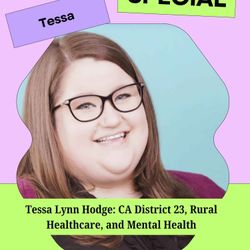
Tessa Lynn Hodge: CA District 23, Rural Healthcare, and Mental Health
53:55|SummaryIn this conversation, Tessa Lynn Hodge discusses her journey from being a licensed clinical social worker to running for office in District 23. She emphasizes the importance of community engagement, healthcare reform, and the need for authenticity in politics. Tessa shares her experiences and insights on the challenges faced by her community, particularly in rural areas, and highlights the significance of mental health accessibility and telehealth. Her campaign focuses on putting people over party and advocating for grassroots funding to ensure real change.Keywordsdisability, politics, healthcare, community, mental health, grassroots, Tessa Lynn Hodge, election, advocacy, social work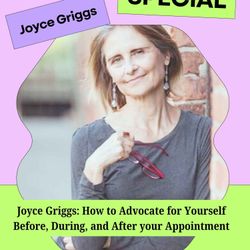
Joyce Griggs: How to Advocate for Yourself Before, During, and After your Appointment
50:25|Keywordshealth advocacy, patient empowerment, healthcare system, self-advocacy, doctor visits, healthcare resources, United States of Healthcare, patient stories, healthcare challenges, AI in healthcareSummaryIn this conversation, Joyce Griggs shares her journey into health advocacy, highlighting the challenges faced by patients in navigating the healthcare system. She discusses the importance of self-advocacy, preparing for doctor visits, and managing the dynamics between patients and healthcare providers. Joyce emphasizes the need for personalized care and the role of technology, including AI, in shaping the future of healthcare. The discussion also touches on the systemic issues within the healthcare system and the importance of community support and resources for patients.TakeawaysAdvocacy is crucial for navigating the healthcare system.Patients often face significant challenges in getting proper care.Self-advocacy is an essential skill for all patients.Preparing for doctor visits can improve outcomes.Emotional management is key before healthcare appointments.Bias exists in healthcare, affecting patient treatment.Community support can empower patients in their advocacy efforts.AI has potential benefits and risks in healthcare decision-making.Personalized care is necessary for effective treatment.Understanding insurance processes can help patients advocate for themselves.TitlesNavigating the Healthcare Maze: A Journey of AdvocacyEmpowering Patients: The Role of Self-AdvocacySound bites"We need to be our own advocates.""We are the experts of ourselves.""Personalized care is essential."Chapters00:00 Introduction to Health Advocacy02:54 Personal Journey into Healthcare Advocacy05:53 Navigating the Healthcare System08:25 Building the United States of Healthcare11:34 Resources for Health Advocacy14:23 Preparing for Doctor Visits17:07 Managing Emotions in Healthcare19:48 Interviewing Healthcare Providers22:49 Addressing Systemic Issues in Healthcare28:02 Navigating Healthcare Access Challenges30:38 Addressing Power Imbalances in Healthcare34:26 The Impact of Bias in Medical Treatment35:22 Evolving Perspectives in Medicine37:23 Utilizing Technology for Patient Advocacy42:04 Building Community and Support46:51 Envisioning a Better Healthcare System50:20 end cap.mp4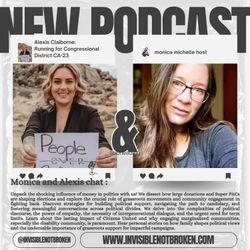
Citizens United & the Disability Vote: Reclaiming Our Democracy Witch Alexis Claiborne
01:14:51|Unpack the shocking influence of money in politics with us! We dissect how large donations and Super PACs are shaping elections and explore the crucial role of grassroots movements and community engagement in fighting back. Discover strategies for building political support, navigating the path to candidacy, and fostering meaningful conversations across political divides. We delve into the complexities of political discourse, the power of empathy, the necessity of intergenerational dialogue, and the urgent need for term limits. Learn about the lasting impact of Citizens United and why engaging marginalized communities, especially the disability community, is paramount. Hear personal stories on how family shapes political views and the undeniable importance of grassroots support for impactful campaigns.money in politics, super pacs, large donations, grassroots movements, community engagement, political campaigns, running for office, candidacy, political discourse, empathy in politics, intergenerational dialogue, term limits, citizens united, disability vote, disability community, marginalized communities, family and politics, grassroots support, election influence, campaign strategies